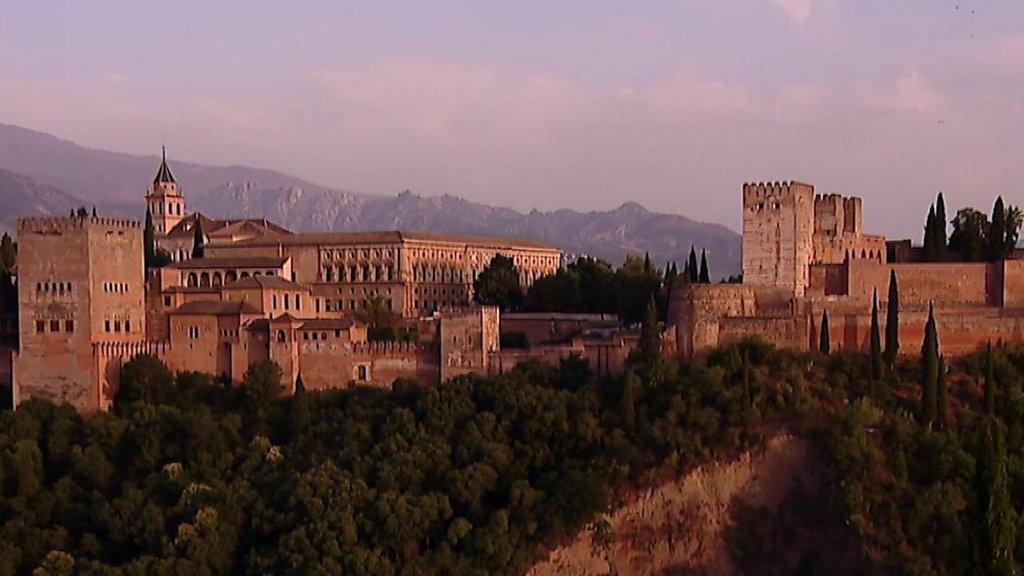Coronavirus: Waiting for tourists on Spain's Costa del Sol
- Published
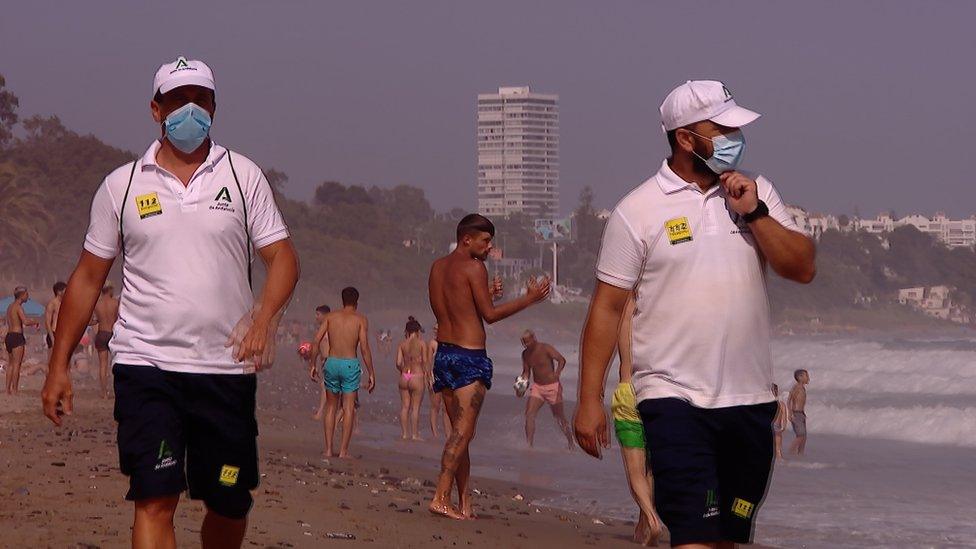
Rafa (L) and Sergio are among 3,000 new beach wardens recruited for the summer season
For many the question this summer is whether they will make it to the beach, and as resorts along the Spanish coast slowly come back to life, the hope is for tourists to return.
Flights are resuming to destinations along the Costa del Sol. After months with no business, hotels, restaurants and bars are reopening and Covid-19 safety measures are being put in place. These are some of the voices on Spain's sun-drenched southern coast.

On patrol with the beach wardens
Strolling along the hot golden sands in Marbella, Sergio and Rafa pause to remind two groups of sunbathers to keep more than 1.5m apart, then stroll on.
They're part of a small army of 3,000 new beach wardens just hired for the summer. Their job is to patrol Spain's southern coasts, gently reinforcing new rules to try to prevent any spread of Covid-19.
Some young men are playing football, and the two wardens ask them to move up the sand so parents and their children can play in the surf. A family who brought four umbrellas to the beach are reminded they're only allowed two sunshades per group.
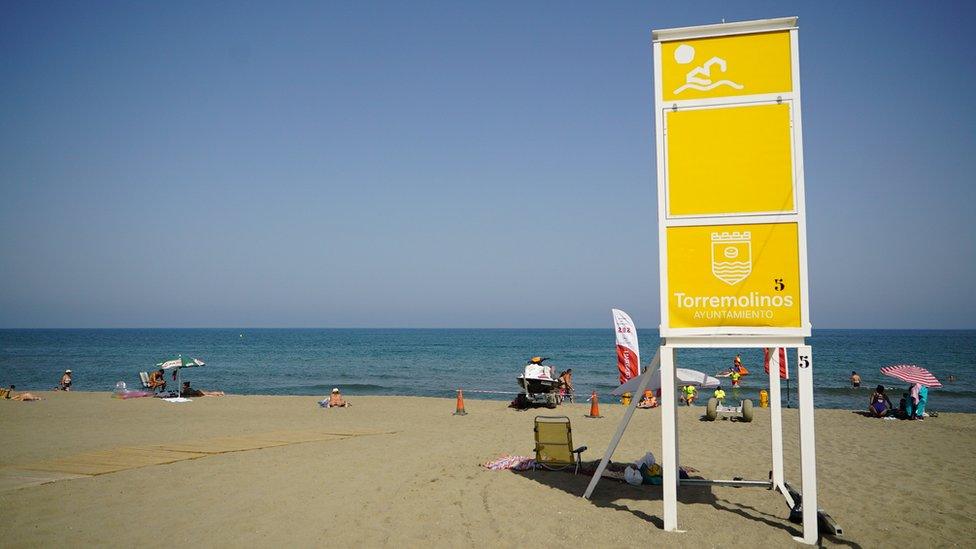
The beach at Torremolinos is quiet for the moment
"People are pretty respectful about observing the rules," says Rafa. "But let's see when tourists arrive from the rest of Spain and everywhere else in Europe too."
He's worried what might happen when people finally make it to the beach after months under lockdown. "Alcohol might be a problem. After a couple of drinks people become less inhibited."
For now it's only Spanish visitors on the beach and Rafa finds it strange that Spain, which saw so many deaths from Covid-19, is not testing people for the virus when they arrive.
"My wife is in a group that's at high risk, so the first day I was a bit worried about bringing the virus home from the beach," he says.

UK couples who spent lockdown in Spain
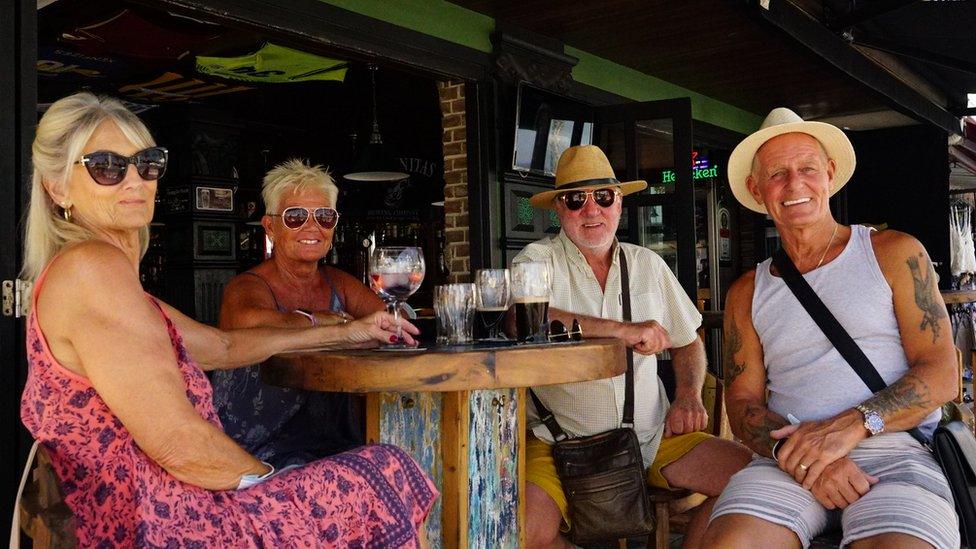
From L to R: Janice George, Stevie Summer, Frank George, David Summer
Sitting on the terrace of an Irish pub overlooking the beach in Torremolinos, Janice and Frank and their friends Stevie and David are absorbing the sea air, having spent the past three months in their houses on the Costa del Sol.
Now that flights are resuming to nearby Málaga airport, new visitors are trickling in. "We'd normally have a plane flying low over our house every three minutes but yesterday I counted seven in the whole day," says Janice.
Nearby, people are out for an afternoon walk along the Paseo Marítimo, the beachside promenade.
Lockdown measures have been lifted, so the walkway under the palm trees is being used again by joggers and rollerbladers.
Almost everyone has a facemask. It's a requirement in Spain that you have to wear one if you cannot be sure you can keep 1.5m from other people. You face a €100 (£90; $110) fine if you don't.
"The Spanish have been amazing and it felt very safe," says David. "They complied with the lockdown rules - and look around! Everybody is wearing or carrying a mask."

From hospital nurse in pandemic to seafront restaurant
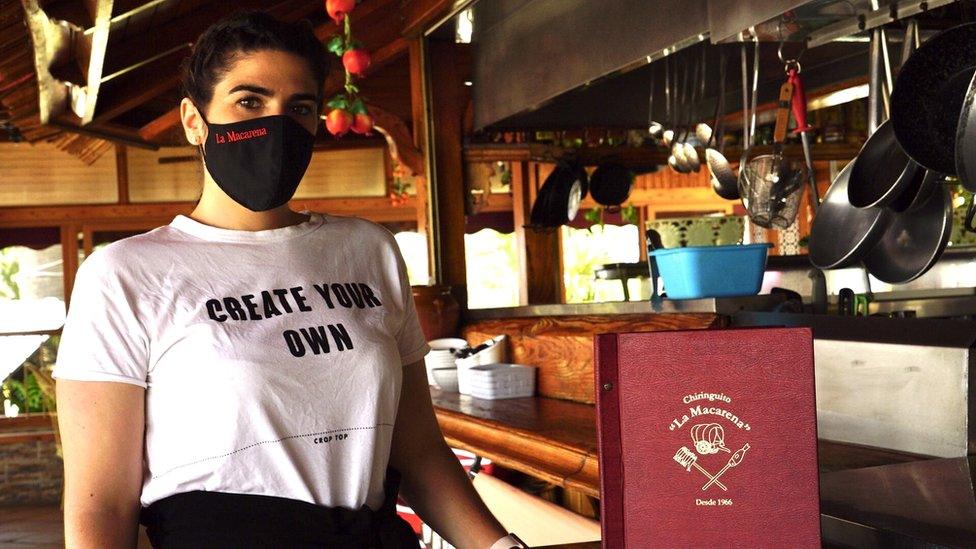
Rocio says the Costa del Sol is all about tourism so it needs people to come back
With her facemask on, Rocio González is making sure everything is ready for customers in La Macarena restaurant on the Paseo Marítimo. She checks the tables are spaced far enough apart, and makes sure the hand-sanitiser at the entrance is full.
Rocio is studying nursing. At the height of the pandemic she was drafted in to help in a hospital in Madrid. Now the number of cases in Spain has declined she's not needed there any longer. So she's back home in Torremolinos to help run the family restaurant for what should be the high season.
Ten million foreign tourists arrived on the Costa del Sol last year. Already half the 2020 summer season has been lost, but businesses are hoping trade picks up soon.
So far most of the tables here are empty.
"This time last season the restaurant would be full, both the terrace and inside. It wouldn't matter what day of the week it was. Monday, Tuesday or Sunday, we'd be run off our feet," says Rocio.
Nearby, the charcoal barbecue has been fired up. Espetos, sardines fresh from the sea, lined up on a skewer, are grilling gently. It's a local speciality.
"The Costa del Sol is about tourism," says Rocio. "Everybody knows that. It's what we live off. So we want them to come."

British barman waiting for customers
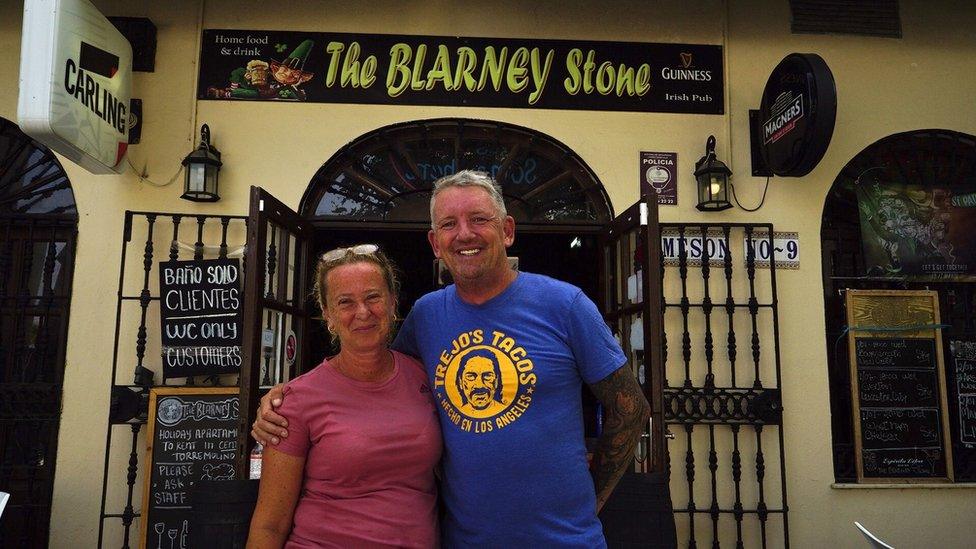
On some days Gary and Maria have seen no visitors at all
There's nobody at all sitting at the tables outside The Blarney Stone, a bar a little further along the seafront in Torremolinos. Owner Gary Mercer is here from 10 in the morning until 11 at night. But it's deserted.
"I'm opening every day because you have to have a routine, it's what keeps you going," he says. "It's important people feel welcome. But today I've had just one customer, for breakfast. Yesterday, nobody."
"This time last year I was taking €1,500 a day. Now it's around €20 a day. Some days zero." As he isn't eligible for Spain's official furlough scheme, he says he's had hardly any financial support from the Spanish government.
At one end of the bar there's a giant Liverpool Football Club flag, and the walls are lined with team shirts. When Liverpool won the Premier League late last month, there was nobody to watch on the giant screen so he stayed at home to watch the game alone.
"I was totally gutted," he says, "the place would normally have been overflowing."
Across the road, the huge, white-washed Riu hotel has around 700 rooms but only a fraction were booked this week.
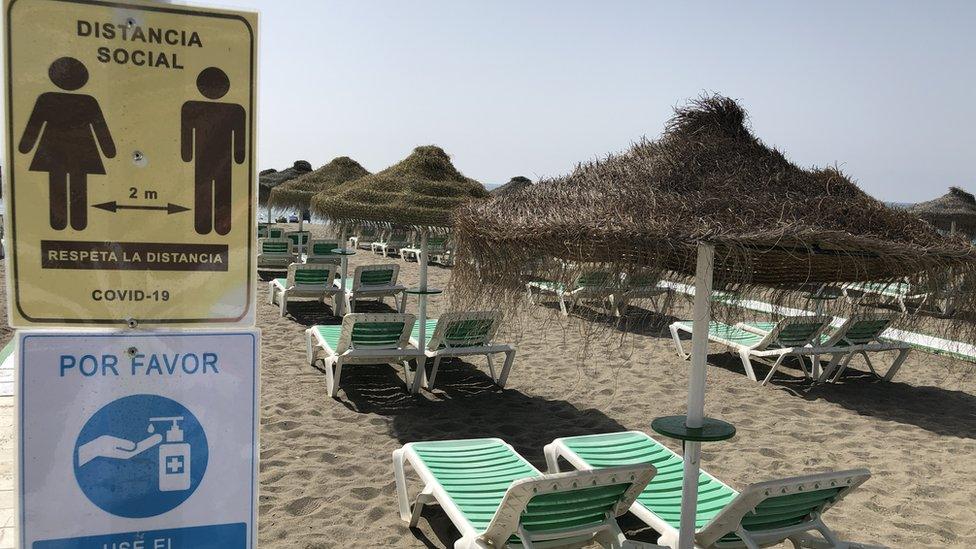
Hand-sanitiser and social distancing await, as soon as the tourists arrive
Around the pool are just a scattering of sunbathers where normally it would be crowded.
The bars here rely on the hotels being full. That now depends on package holiday companies starting up flights again, and that won't happen until governments start lifting travel restrictions.
The hope on the Costa del Sol is that visitors will start coming back in mid-July. "'For now we just have to buckle down," says Gary.
Spain's Alhambra Palace reopens to visitors
- Published29 June 2020
